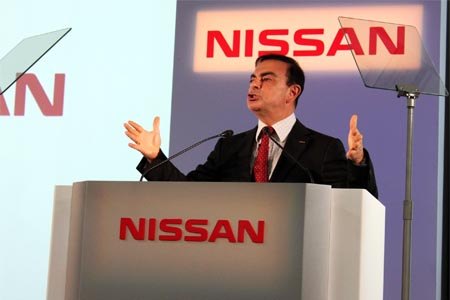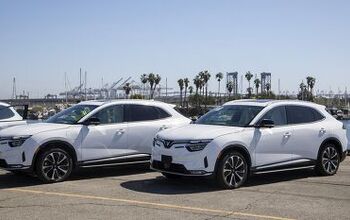One Country's Misfortune Is Another Country's Market Share. Don't Bank On It

“If you have no cars, you will lose market share,” said double-CEO Carlos Ghosn at last week’s annual results conference of Nissan. He said openly what other carmakers on the other side of the Pacific only dare to whisper into the ears of sympathetic reporters, or via analysts at banks and brokerages: The March 11 tsunami will cost Japanese makers big chunks of market share. The questions is: For how long?
Ghosn is not buying into the well-meant argument that customers will be slavishly loyal and will hold off buying until Japan is ready to deliver:
“People need cars and they will not wait for us for six months. They will be moving to the competition, and we have to accept the fact that in some markets we will have a significant loss in market share.”
However, it is premature to think that drowning the east coast of Japan in a wall of water is God’s own bailout for Detroit. Here are some points to consider.
- In my talks with Japanese manufacturers, “Hyundai” and “Volkswagen” come up with regularity, “GM” or “Ford” rarely rate a mention. The thinking is that an import customer will rather buy another import than go domestic. And indeed, both Hyundai and Volkswagen are on a tear. I know, both are not popular in blog comments.
- Hyundai Motor America reported-all time record April sales of 61,754 units, up 40 percent compared with the same record-breaking period last year. For the year, total sales are up 31 percent, with retail volume rising 40 percent. Hyundai’s global sales were up nearly 10 percent in April.
- The Volkswagen Group recorded a 13.9 percent in global deliveries in the first 4 months of the year, and a 14.5 percent increase in April.
- The tsunami crisis will keep Japanese automakers busy for a while, but it is not a terminal disease. In fact, automakers appear to recover faster than thought. Nissan wants to be back to normal in October. Toyota said they will be at 70 percent of plan in June, earlier than thought, with a return to full normalcy in November/December.
- When Japanese automakers are ready to deliver again, count on aggressive campaigns that remind customers that their brand is back, and stronger than ever. Ghosn announced to a somewhat incredulous press corps last week, that for Nissan, “2011 should be a progress in terms of sales compared to last year.” He is clearly banking on making up a lot of the shortfall in the last quarter.
- Despite loan paybacks, the Detroit 3 are heavily leveraged, interest payments are high. The big Japanese automakers are sitting on piles of cash. Even notoriously leveraged Nissan is now cash positive. There is enough in the war chests to go on a broad sales offensive when the pipelines are full again.
- Also, expect that automakers will send their cars where they are needed the most. Ghosn was refreshingly blunt last week when he said: “What we are trying to do is to protect some selective markets. You will see the availability of cars to be much more important in the U.S. or China, because we consider them critical markets. The shortfall will not going to be equal in all markets.”
Japanese carmakers, especially heavily export-exposed Toyota, are more worried about the effects of an overvalued yen.
“Japan has been weakened by the tsunami, and one would think that the currency mirrors a country’s strength,” a high Japanese industry executive told me on Friday night. “But apparently, this is not the case.”

Bertel Schmitt comes back to journalism after taking a 35 year break in advertising and marketing. He ran and owned advertising agencies in Duesseldorf, Germany, and New York City. Volkswagen A.G. was Bertel's most important corporate account. Schmitt's advertising and marketing career touched many corners of the industry with a special focus on automotive products and services. Since 2004, he lives in Japan and China with his wife <a href="http://www.tomokoandbertel.com"> Tomoko </a>. Bertel Schmitt is a founding board member of the <a href="http://www.offshoresuperseries.com"> Offshore Super Series </a>, an American offshore powerboat racing organization. He is co-owner of the racing team Typhoon.
More by Bertel Schmitt
Latest Car Reviews
Read moreLatest Product Reviews
Read moreRecent Comments
- Redapple2 Love the wheels
- Redapple2 Good luck to them. They used to make great cars. 510. 240Z, Sentra SE-R. Maxima. Frontier.
- Joe65688619 Under Ghosn they went through the same short-term bottom-line thinking that GM did in the 80s/90s, and they have not recovered say, to their heyday in the 50s and 60s in terms of market share and innovation. Poor design decisions (a CVT in their front-wheel drive "4-Door Sports Car", model overlap in a poorly performing segment (they never needed the Altima AND the Maxima...what they needed was one vehicle with different drivetrain, including hybrid, to compete with the Accord/Camry, and decontenting their vehicles: My 2012 QX56 (I know, not a Nissan, but the same holds for the Armada) had power rear windows in the cargo area that could vent, a glass hatch on the back door that could be opened separate from the whole liftgate (in such a tall vehicle, kinda essential if you have it in a garage and want to load the trunk without having to open the garage door to make room for the lift gate), a nice driver's side folding armrest, and a few other quality-of-life details absent from my 2018 QX80. In a competitive market this attention to detai is can be the differentiator that sell cars. Now they are caught in the middle of the market, competing more with Hyundai and Kia and selling discounted vehicles near the same price points, but losing money on them. They invested also invested a lot in niche platforms. The Leaf was one of the first full EVs, but never really evolved. They misjudged the market - luxury EVs are selling, small budget models not so much. Variable compression engines offering little in terms of real-world power or tech, let a lot of complexity that is leading to higher failure rates. Aside from the Z and GT-R (low volume models), not much forced induction (whether your a fan or not, look at what Honda did with the CR-V and Acura RDX - same chassis, slap a turbo on it, make it nicer inside, and now you can sell it as a semi-premium brand with higher markup). That said, I do believe they retain the technical and engineering capability to do far better. About time management realized they need to make smarter investments and understand their markets better.
- Kwik_Shift_Pro4X Off-road fluff on vehicles that should not be off road needs to die.
- Kwik_Shift_Pro4X Saw this posted on social media; “Just bought a 2023 Tundra with the 14" screen. Let my son borrow it for the afternoon, he connected his phone to listen to his iTunes.The next day my insurance company raised my rates and added my son to my policy. The email said that a private company showed that my son drove the vehicle. He already had his own vehicle that he was insuring.My insurance company demanded he give all his insurance info and some private info for proof. He declined for privacy reasons and my insurance cancelled my policy.These new vehicles with their tech are on condition that we give up our privacy to enter their world. It's not worth it people.”



































Comments
Join the conversation
Keep in mind, those Cruzes are just repackaged Daewoo junk. That was a real success!
Ever since the Japan disaster began, I have thought that Hyundai would benefit from the market disruption. However, since Hyundai is already on a tear, it may take some time to discern a 'tsunami bump' from the regular record-setting that Hyundai is already doing every month anyway.